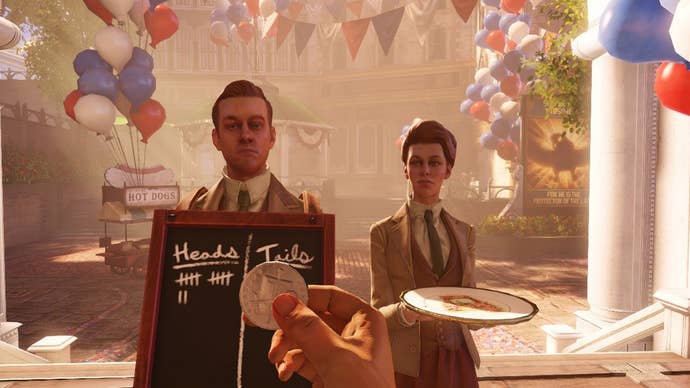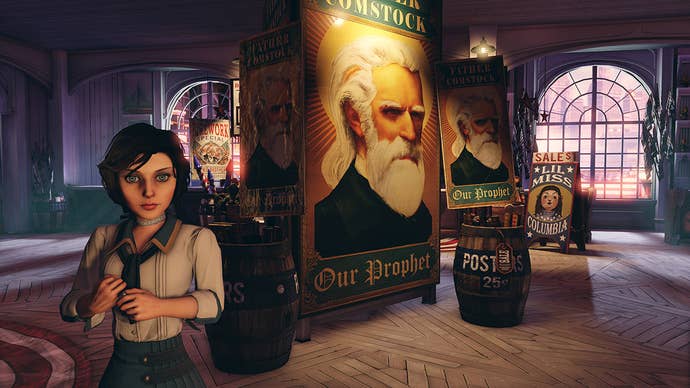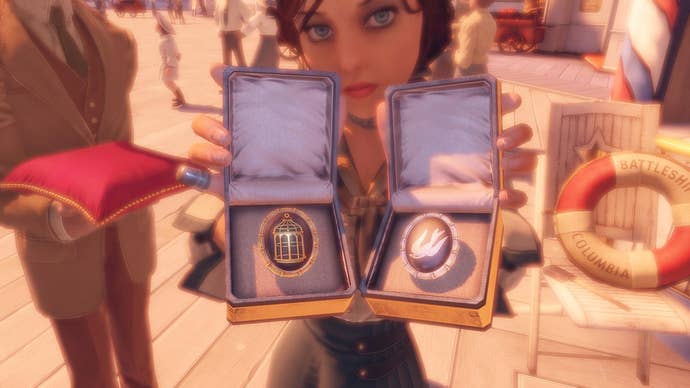2013 in Review: The Tragic Fatalism of BioShock Infinite
One of 2013's most spectacular games was also one of its most disappointing for its failure to heed its predecessor's pivotal philosophy.
This article first appeared on USgamer, a partner publication of VG247. Some content, such as this article, has been migrated to VG247 for posterity after USgamer's closure - but it has not been edited or further vetted by the VG247 team.
"A man chooses -- a slave obeys."
If people remember anything about 2007's BioShock, it's almost certainly the pivotal confrontation with eccentric tycoon Andrew Ryan. Though he's presented as the villain of the piece until that moment, your showdown with Ryan doesn't take the form of a grand battle; on the contrary, the game -- through Ryan -- wrests control of the action away from the player, who is then forced to watch as his on-screen avatar clutches a golf club and, at the industrial's own command, bludgeons Ryan to death.
It's a powerful moment that works on many levels. On the most fundamental level, it's a plot twist, forcing the player to come to terms with the fact that the man they've been helping in the fight against Ryan is the true villain of BioShock. It also speaks volumes about Ryan, a man so determined to maintain control of his own destiny (his city Rapture has been founded on the maxim, "No gods or kings, only men") that he would choose effective suicide by the hand of his brainwashed son simply to deny his enemies the satisfaction of determining the nature of his demise.
But Ryan's oft-repeated philosophy -- "A man chooses, a slave obeys" -- speaks volumes about the player's role in events. On one level, it offers a level of justification for the game's plot that video games rarely bother with. Why would someone simply accept their role as a stranger's instrument of destruction upon crash-landing in a setting they'd never before seen if not for the fact that he had no control over his own actions? The player becomes a tool because he assumes the role of a character conditioned to be nothing more than a tool.

In the process, it forces the player to consider the nature of video games as a whole. The player is a slave, it says. We "take control" in a first-person shooter only to mutely follow instructions, to shoot our way from point A to point B in service of a voice in our ear barking instructions that few games allows us to stray from. In some ways, it was practically prophetic; BioShock launched a couple of months before Call of Duty: Modern Warfare, the game that redefined the mainstream first-person shooter as a linear march through environments comprised of narrow corridors dressed up to look as though they could belong to an open world of free choice if only there weren't this urgent mission to attend to. No; choice and agency in video games, BioShock posits, are nothing more than an illusion.
This powerful and prescient statement made BioShock Infinite all the more intriguing for me. I loved what I saw of Infinite in the years leading up to its debut; steeped in American history, its fantastic spirit seemed a brightly colored (and very welcome) alternative to the grim drabness of other shooters. If BioShock presented players with an Art Deco nightmare, Infinite promised to give us a joyful turn-of-the-century summer carnival daydream. More importantly, though, both Infinite's title and the glimpses we saw of its story and game mechanics -- the strange alternate futures, the ability to summon impossible mechanisms through rifts in space -- looked to build thematically on the original BioShock's underlying concepts of choice and control.
In the end, Infinite did indeed have much to say about agency and self-determination. But it wasn't the statement I was hoping to hear, or in fact one I agree with at all: It utterly denies their existence.

Maybe my mistake in approaching Infinite was in reading Ryan's proclamation as a philosophy BioShock developer Irrational actually stands behind. After all, consider the fallout from that sequence in the original game; even the original BioShock didn't uphold Ryan's beliefs. The confrontation seems like a liberating moment, confronting the player with the truth of their limitations and treating Ryan's death as a brutal exclamation point, but in truth you're never actually allowed to choose anything even after your limitations are revealed. Frank Fontaine, exposed as the true villain of the piece, is simply replaced as the voice dictating your actions by a different but equally domineering voice, and the remainder of the game remains every bit as structured and linear as what's come before. Worse, actually, as you're forced to undertake a compulsory (and almost universally hated) escort mission whose tedium truly hammers home how much you're simply going through someone else's motions. Ryan's dying words may goad you to take control and become a man, but you can't. BioShock shackles you into slavery from start to finish.
Infinite, though, actually manages to be even more bleak with its message. Not only does it offer fewer opportunities to make choices than its predecessor, in the end you learn those choices lack any real meaning. Early in the game you're given a chance to call a coin flip, but it turns out to be simply an exercise in intellectual curiosity; whatever you call, the coin always comes up the same across all realities. Later, the Lutesce "twins" (the scientists who sponsored the coin flip) let you choose between two pieces of jewelry, a bird and a cage, symbols seemingly fraught with narrative importance given your recent rescue of a young woman named Elizabeth from a locked tower guarded by a bird-like robot; yet your choice bears no significance on any in-game events, and either selection elicits the same cheerful response from the Lutesces.
The entirety of Infinite turns out to be a quest to rewrite the most important decision the protagonist ever made. It's a journey to destroy the entire concept of free will.
In the end, BioShock Infinite takes its name from the revelation of an infinite panoply of alternate realities created by the choices people make. The crux of the plot hangs on a pivotal decision made by the player's character, Booker DeWitt -- but it's one that happened decades prior, one in which the player has no say. On the contrary, the entirety of Infinite turns out to be a quest to undo that action; you're driven constantly forward to reach a point at which you can rewrite the most important decision the protagonist ever made. It's a journey to destroy the concept of free will. And the final, irrevocable decision of finite outcomes isn't even made by the player. The choice is made for him by DeWitt and Elizabeth. DeWitt, in the end, proves to be far more of a slave than BioShock's mind-controlled Jack Ryan -- and so too, by extension, does the player. Infinite entices the player with a multiverse of endless possibilities, yet it allows only a single outcome.
Oh, sure, the player gets to make choices in the course of BioShock Infinite. Do you fight this battle from the upper landing, or do you try to hold the lower choke point? Do you focus on Vigors in combat, or do you let Elizabeth do the dirty work by opening rifts? Gun down foes from rails or go in close for nasty melee kills? But if you're looking for meaningful choices that don't involve killing -- up to and including choosing not to fight in the first place -- Infinite has nothing to offer.
I think it's BioShock Infinite's pedigree and potential that make its relentless determinism so disappointing. Its DNA contains fragments of the legendary Looking Glass Studios, the same developer that spawned (or spun off into studios responsible for) System Shock, Thief, Deus Ex, and Dishonored -- games with the same heady intellectual underpinnings as BioShock. But those games all aspired to offer more than mere lip service to player agency; they delivered. Of course, even they ultimately funneled the player to specific outcomes, but they offered far more flexibility in reaching those points than Infinite even pretends to provide. Even Deus Ex: Human Revolution's oft-derided finale, which consisted of choosing an ending by pressing one of several buttons, gave the player more determination over that story's outcome than Infinite.

No, BioShock Infinite spits in the face of player choice. If BioShock stunned us by laying bare the illusion of agency in video games, Infinite in turn stunned us by making a mockery of it. And maybe that's all Irrational has ever aspired to do. Maybe it's not fair for me to judge the game based on what I perceive as its creative potential and narrative posturing; who am I to proclaim authorial intent? But everything about Infinite leading up to launch led me to expect Irrational to follow up BioShock's revelation of gaming's illusory nature with an equally revelatory look at alternatives, ways that games could allow players to rise up from video game slavery and choose their own outcome. Instead, Infinite literally concludes by saying, "There can be no alternatives."
I guess I expected something more hopeful from Irrational, which employs some of the smartest guys in the games industry. I look at the medium's other thought leaders and see Will Wright talking breathlessly about universes of possibilities. I see Peter Molyneux dreaming so big he can't help but fail spectacularly as he grasps at his aspirations. With Infinite, though, Irrational has funneled a tremendous amount of time, energy, labor, and money into towing the line. The results are beautiful, intriguing, and often fun -- but they make a lie of the BioShock legacy, or at least the legacy that I took away.
It's no secret that video games have grown more limited as they've become more elaborate; the further we move from the days of Infocom's humble-but-imaginative text-only adventures, the less latitude players are given to define their own paths. BioShock revealed the man behind curtain of games like Call of Duty before Call of Duty even hit its stride; six years later, I was heartbroken to see the series simply shrug and accept that this is the most video games can aspire to be: A selection of pretty skins on a fundamentally homogenous core.
But I'm not buying it, and neither are many others who invested their hopes in BioShock Infinite as an alternative to the stagnation of big-budget games rather than serving up more of the same. Not when there are more ambitious and inventive approaches being explored in works that aren't manacled by big budgets and enslaved to conservative publishers. We know we have the freedom to make choices; BioShock told us so.
